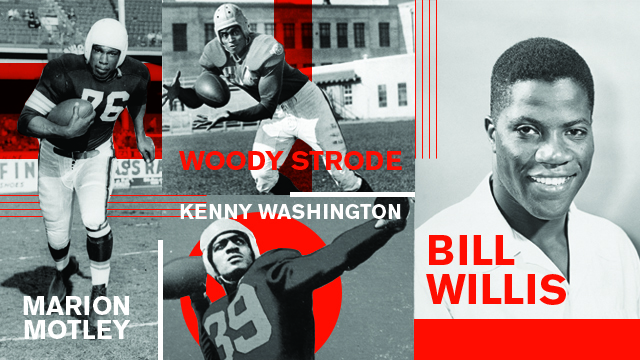Meet Four Men Who Broke The NFL's Color Line

In a time where establishments such as restaurants, hotels, performance venues and stadiums were separate, and often far from equal, professional sports competitions varied greatly from the game played today. During the late-1940s, racial segregation was the cultural norm in many American cities, and Jim Crow laws still ruled southern and border states.
Despite these tense social conditions (and 20 years before the Civil Rights Act of 1964), four valiant men helped integrate the NFL in 1946, one year before Jackie Robinson smashed professional baseball's color barrier. Four men whose names are not commonly known or recognized set the pace for what would become a diverse league of the world’s best athletes with a current African-American racial makeup of more than 65%.
How It Happened
In 1920, Fritz Pollard became the first African-American to play in the NFL during its formative years. However, in the years after Fritz’s departure, the NFL owners imposed a “gentleman’s agreement” preventing the signing of more black players. The four men below are credited with re-integrating the NFL in 1946.
The Los Angeles Coliseum threatened to evict the Los Angeles Rams unless the team signed an African-American player, which set the stage for UCLA stars Kenny Washington and Woody Strode to the roster. A few months later, Bill Willis and Marion Motley started their journeys in professional football with the Cleveland Browns.
Kenny Washington and Woody Strode, Los Angeles Rams
Washington led the nation in scoring in 1939, playing 580 out of 600 minutes for the Bruins en route to becoming first All-American UCLA player. Despite his obvious athletic prowess, there was no place for Washington at the professional level. At the time, the league was in the midst of a 12-year ban on African-American players, steered into place in 1933 by Washington Redskins owner George Preston Marshall.
After signing with the Los Angeles Rams, Washington had three solid NFL seasons, with highlights including 7.4 rushing yards per attempt. He still holds a 92-yard running record for the Rams.
Washington’s UCLA teammate, Woody Strode, also signed with the Rams in 1946. After his first season alongside Washington at the Rams, Strode decided to pursue other career paths, citing issues such as a lack of playing time and constant racial abuse as contributing factors to his quick departure. Once being quoted by a reporter in 1971, Strode said, “If I have to integrate heaven, I don’t want to go.”
Fortunately, Strode found success in other talents, making his professional acting debut in the 1960s. Strode starred in several films including The Ten Commandments (1956), Spartacus (1960), Once Upon A Time in the West (1968) and The Man Who Shot Liberty Valance (1962).
Bill Willis and Marion Motley, Cleveland Browns
After an All-American career at The Ohio State University, Bill Willis joined the newly-formed Cleveland Browns of the All-America Football Conference playing defensive tackle. The 210-pound defensive star was extremely quick and light on his feet -- so much so that his play helped create the position we know today as "linebacker." He played eight seasons and appeared in three NFL Pro Bowls, anchoring the team’s defense as the Browns dominated their conference.
Marion Motley joined the Cleveland Browns in 1946 alongside Willis. Playing on both sides of the ball, Motley demanded respect on and off-the-field with his focus on game performance. Although Motley’s addition to the team was initially to provide a roommate for Willis, Motley finished his four-year career with 3,024 yards, a 6.2 yards-per-attempt average and 26 touchdowns.
Unpleasant and racially charged moments were not foreign. Willis shared in “The Game That Was” how he coped with moments of tension from opposing players:
“I soon won the respect of my opponents,” Willis said. “They learned that I could take it and dish it out, and I didn’t really have to play dirty ball to hold my own. Speed was my greatest asset, but I could unleash a pretty solid forearm block and a rather devastating tackle.”
"They found out that while they were calling us n*ggers and alligator bait, I was running for touchdowns and Willis was knocking the sh*t out of them," Motley once said. "So they stopped calling us names and started trying to catch up with us."
Both Motley and Willis were elected to the Pro Football Hall of Fame, in 1968 and 1977 respectively.